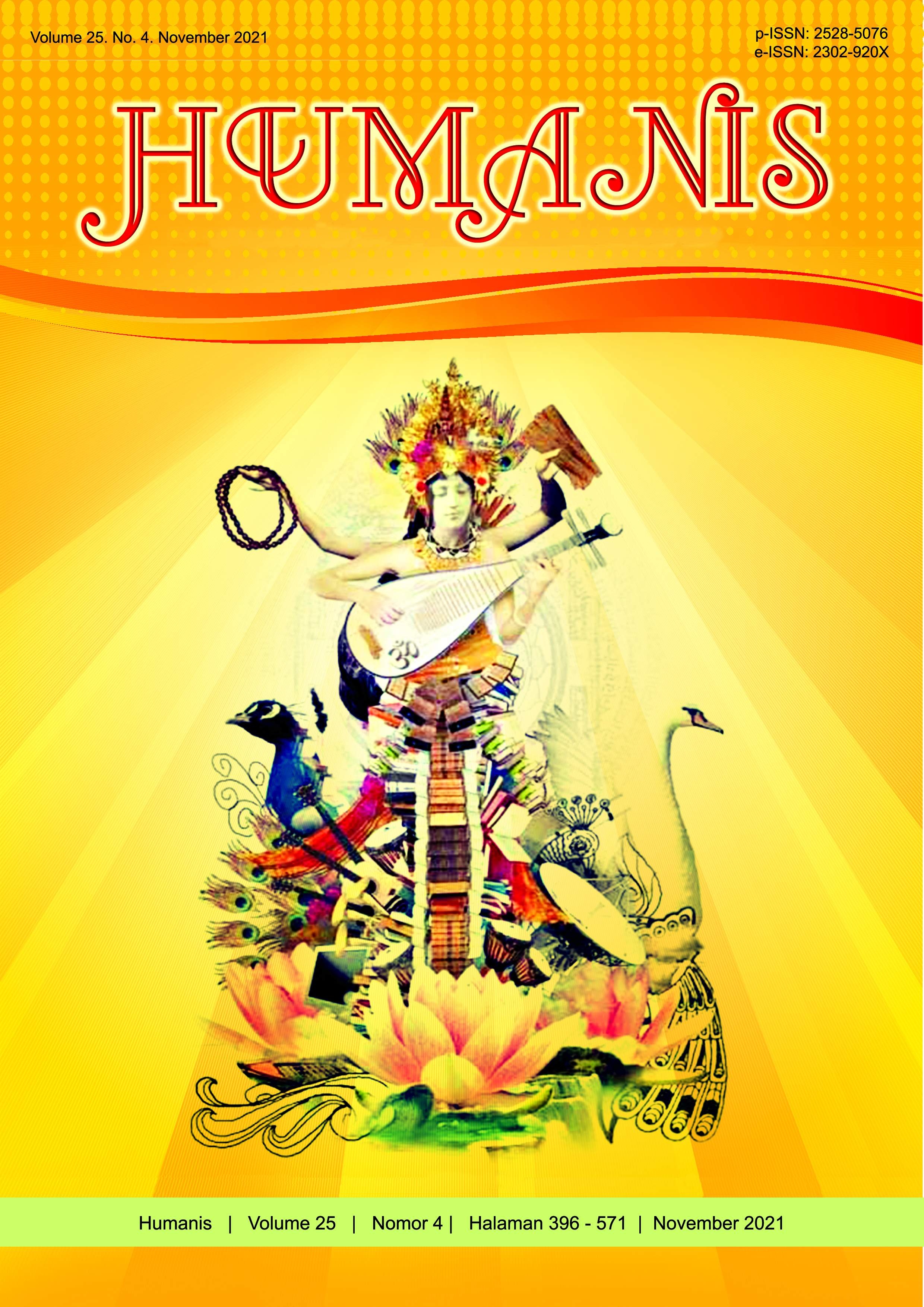Lavender Linguistics: Lexicon Used by Gay People in Bali For the Topic of Preferences
Abstract
This study aims to find out the lexicon and its meanings used by gay people in Bali for the topic of preference. The data was collected through qualitative methods by interviewing informants, recording, and note-taking as well as doing participatory observation to gay people from several places, nightclubs, and communities in Bali including Balijoe, and Mixwell bar in Seminyak, and Bali Peace Crew Community in Denpasar. The data was qualitatively analyzed and descriptively presented based on lavender linguistics, which according to William Leap, is a study about the language used by the queer community to communicate. The theories used are sociolinguistics theories proposed by Yule which are slang and speech varieties. It resulted in 10 lexicons were used by gay people in the level of word, phrase, and abbreviation to exchange information or communicate with the interlocutors. The meanings of each lexicon are influenced by participants, setting, topic, and function.
Downloads
References
American Psychological Association. (2008). Answers to your questions: For a better understanding of sexual orientation and homosexuality. Washington, DC: Author. Retrieved fromwww.apa.org/topics/sorientation.pdf.
Boellstorff,T. (2004). Gay Language and Indonesia : Registering Belonging. Journal of Linguistic Anthropology. Vol.14, Issue 2.
Butler, J. (2004). Undoing Gender. New York: Routledge.
Cage, K. (2003). From Moffietaal to Gayle - the evolution of a South African gay argot. Johannesburg, South Africa: s.n.
DeWalt, Kathleen M. & DeWalt, Billie R. (2002). Participant observation: a guide for fieldworkers. Walnut Creek, CA: AltaMira Press.
Georgieva, M. (2014). Introducing Sociolinguistics. United Kingdom: University of Sofia Press.
Holmes, J. & (2013). An Introduction to Sociolinguistics. 4th ed. London and New York: Routlegde.
Holmes, J. & Wilson, N. (2017). An Introduction to Sociolinguistics. 5th ed. London and New York: Routlegde.
Kulick,D. (2000). Gay and Lesbian Language. Journal of Anthropology. Vol.29.
Lambert, V.A, & Lambert, C.E. (2012). Editorial: Qualitative Descriptive Research: An Acceptable Design. Pacific Rim International Journal of Nursing Research. Vol.16, No.4.
Leap, William. (1995). Beyond the lavender lexicon: Aunthenticity, imagination, and Appropriation in Lesbian and Gay language. Luxembourg: Gordon and Brach.
Morgan, M. (2003). What are speech community?. New York: Cambridge University Press.
Nassaji, H. (2015). Qualitative and Descriptive Research: Data Type Vs Data Analysis. Language Teaching Research. Vol 19, No. 2.
Oxford. 2017. Oxford Learner’s Pocket Dictionary. 4th ed. New York: Oxford University Press.
Oxford. 2021. Chaser. Oxford Learner’s Dictionaries. Retrieved from:Https://www.oxfordleranerdictionaries.com/defenition/english/chaser.
Paradis, E. et al. (2016). “Design: Selection of Data collection Methods”. Journal of Graduate Medical Education. Vol.8.
Ritchie, J., Lewis, J., & Elam, G. (2003). Designing and selecting samples. In J. Ritchie & J. Lewis (Eds.), Qualitative research practice: A guide for social science students and researchers. Book Section, London: Sage.
Rudwick, S. (2010). 'Gay and Zulu, we speak isiNgqumo': Ethnolinguistic identity constructions. Transformation: Critical Perspectives on Southern Africa, Vo. 1. Issue 74.
Yule, George. (2010). The Study of Language. New York: Cambridge University Press.


















